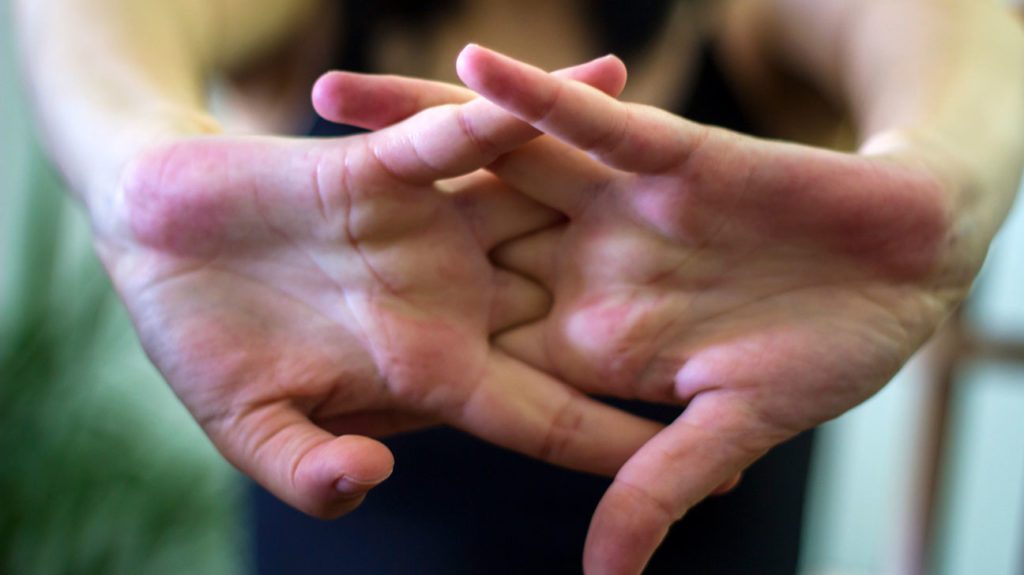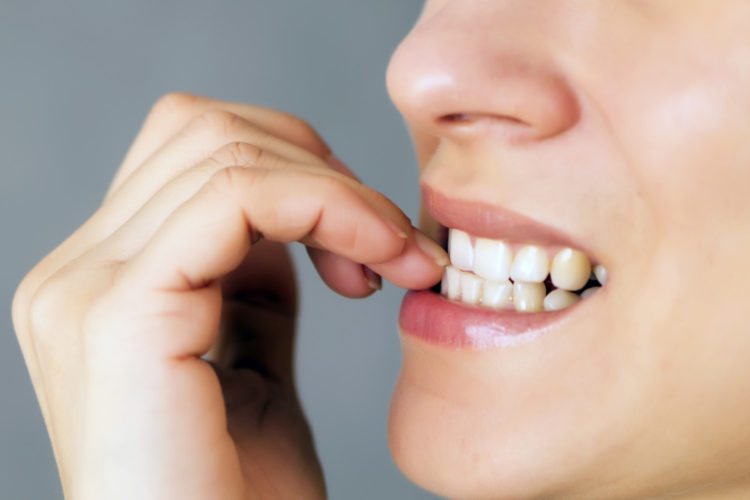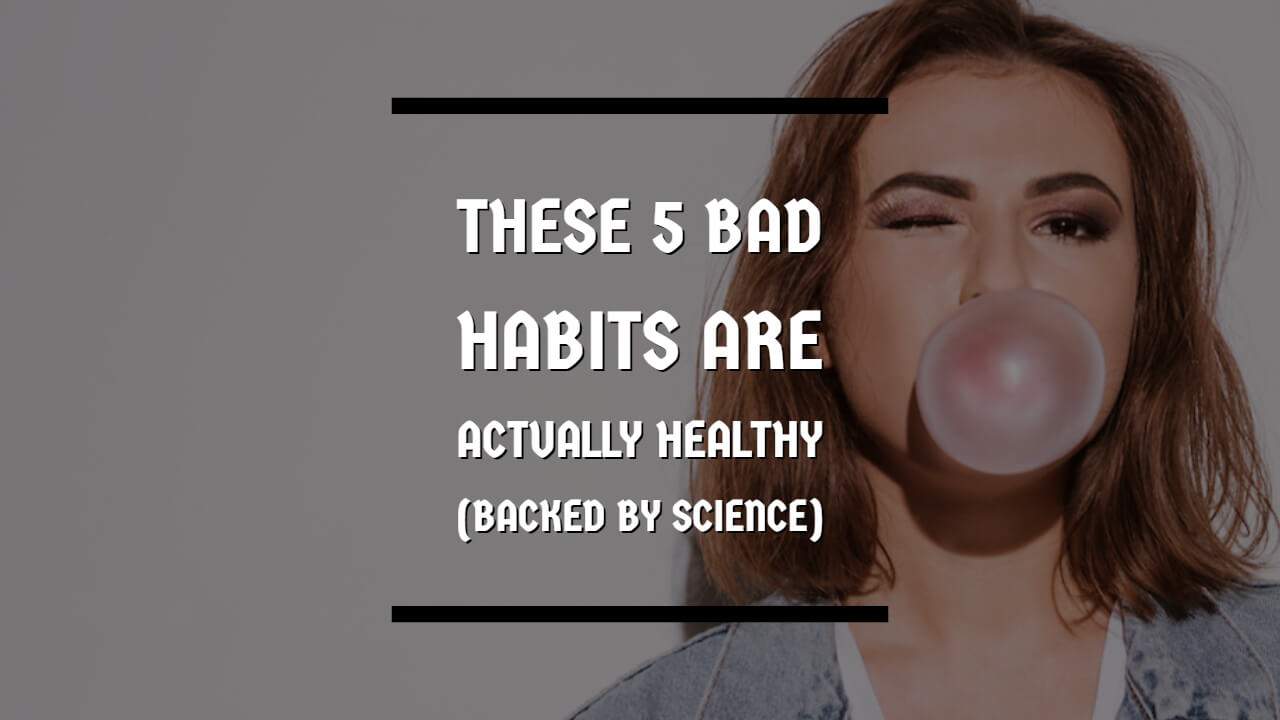We’ve all got bad habits. It’s kinda part of the whole ‘being human’ package. We might even feel kind of bad about not breaking those habits sometimes. Well, I’m here to tell you to stop feeling guilty! Scientists have found surprising upsides to things like swearing and biting your nails. So let’s take a closer look at the research behind five so-called “bad” habits.
Knuckle cracking

You might have been told to stop so you don’t wreck your fingers. A whole lot of people believe that cracking your knuckles damages your joints, and that can lead to arthritis. But that is not true.
That factoid was based on a study from 1990 that mistakenly concluded that knuckle cracking resulted in ‘functional hand impairment’. That research was criticized for not being controlled well, meaning the conclusions couldn’t be trusted. But, it did manage to kick off a whole lot of follow up studies that showed us that, actually, it doesn’t hurt your joints at all. For example, studies have found older people with a history of knuckle cracking don’t have any more knuckle degeneration than those that don’t.
The only effect cracking seems to have is that it opens up the joint’s range of motion a little. The sound might make you think something is being forced back into place, so it’s kind of understandable that people might think a tendon or bone or something is physically snapping. But, that’s not what’s happening. Ultrasounds of the base joint of fingers, known as the metacarpophalangeal joint, have shown that when a joint cracks, a bubble rapidly forms and then collapses in the synovial fluid, the stuff between the bones that keeps them lubricated.
That bubble popping or, maybe the creation of the bubble, we’re not 100% sure, is what makes the sound.
Even if cracking itself doesn’t cause damage, damaged joints can start to pop and hurt. So if something’s painful, go get that checked out.
Sources:
NCBI -:
Effect of habitual knuckle cracking on hand function – by – NCBI
The Consequences of Habitual Knuckle Cracking – by – NCBI
Others -:
Ultrasound Reveals Knuckle-Cracking Fireworks – by – RSNA
What causes the noise when you crack a joint? – by – EverydayMysteries
Crepitus (Joint Popping) – by – AuroraHealthCare
Gum chewing

People say it’s bad for your teeth, and well, frankly, it’s just annoying if a person does it loudly. No one wants to hear chewing noises. But it turns out chewing is kind of awesome for you, especially if you’re trying to be productive.
Studies have found that the act of chewing gum is associated with enhanced attention and work performance.
And weirdly enough, that research didn’t just find that chewing gum gives you an attentional boost. The speed and force with which you chew affect just how much benefit you get.
Chewing too fast seems to slow your reaction speed a little, slow but steady is the key. And chewing relatively hard is associated with faster information processing. Studies have also found that things like cortisol levels and heart rate increase when you’re chewing, and that in turn supports the idea that the act of chewing gum makes people more alert.
Some researchers think these effects could be attributed to minty flavors. It’s possible they’re just super refreshing and wake people up, kind of like a mini cold shower for your mouth. But that’s definitely not the whole story. Some studies have found that things like quicker reaction times in gum chewers, even if the gum they’re chewing is flavorless.
And in one study with flavorless gum, brain scans showed increased activation in the anterior cingulate cortex and left frontal gyrus of the chewers, areas that are related to attention and motor control. This suggests that chewing really does alter your brain’s ability to focus.
There are theories like, that it’s causing increased blood flow to the brain, or that the action itself is just super soothing and stress relieving.
Make sure to chew sugar-free gum. Because those sugar-loaded chew gum can damage your teeth.
Sources:
NCBI -:
Chewing Gum: Cognitive Performance, Mood, Well-Being, and Associated Physiology
Effect on electroencephalogram of chewing flavored gum
Effects of chewing on cognitive processing speed
Chewing and Attention: A Positive Effect on Sustained Attention
Others -:
Swearing

Swearing a lot might indicate some nice things about you. Research has shown that potty mouths actually have larger vocabularies. That is, except when those swears consist mostly of sexist slurs. Turns out female-sex-related slurs have transitioned into our everyday lexicon in recent decades. That means people that reach for those particular curses don’t have to dig as deep into their vocabulary, so saying them doesn’t signal verbal ability.
Researchers have found that dropping a couple of choice phrases at the right moment might provide all sorts of benefits from stress relief to improved social relations.
A 2017 study published in the Journal of Managerial Psychology reported wide use of swears in the workplace by lawyers, medical professionals,
and business executives. When interviewed, their 52 participants stated that cursing was useful in a wide range of settings, like to indicate you’re close with your colleagues, and to show that you’re passionate. And this idea that swearing helps cement bonds between people is especially intriguing since psychologists have also found that swearing correlates with measures of honesty.
That same 2017 study also found swearing provided some stress relief to tense working conditions introducing a fun, less intense atmosphere. And on top of all of that, studies have shown cursing can actually dull pain and make you more resistant. Like, people can keep their hands in icy water for longer, or squeeze a joystick harder when they’re swearing than when they’re saying other, non-taboo words.
There’s no complete consensus on why this effect happens, but some evidence suggests that saying bad words activates your fight or flight response, and therefore, triggers a flood of chemicals that help act tougher up in scary situations.
So, it seems swearing has its benefits, even at work. But still, maybe don’t risk it while the boss is around unless you know they’re cool with it. Also, it’s probably best if it’s an occasional thing, rather than every other word.
Sources:
Swearing at work: the mixed outcomes of profanity – by – Emerald
Frankly, we do give a damn: The relationship between profanity and honesty – by – Academia
Swearing as a response to pain – by – NeuroReport
THE SCIENCE OF WHY SWEARING REDUCES PAIN – by – Wired
Nail-biting

A lot of people don’t even realize when they’re biting their nails. It becomes so ingrained because they started doing it as a kid. And it turns out developing that habit in childhood actually has health advantages.
Research has shown that people who chewed their nails and/or sucked their thumb as kids are less likely to develop allergies in their teens, and even in their 30s. That’s because there’s a lot of grossness, on your hands. Especially under your fingernails.
Scientists have found that exposure to such things in small amounts can help keep your immune system from developing an allergic response to them. Basically, if your body has seen it all before and knows these common things won’t kill you, it doesn’t freak out when it sees them later on.
And since a little childhood finger sucking or nail nibbling means you ingest more of this stuff in your younger years, you don’t end up with as many allergies when you grow up.
In fact, doctors recommend you don’t chew your nails at all as an adult. All that nibbling can cause cracks in the skin, which could then let harmful bacteria in, putting you at a greater risk for infection. Studies have also found that the positions you have to wrangle your jaw into to gnaw on your nails can even lead to lasting dysfunction in the temporomandibular joint, or TMJ.
And that comes with a whole host of not-so-fun symptoms, like jaw pain, popping while chewing, headaches and difficulty opening wide. So adults, by all means, keep your nails trimmed, but just, maybe, not with your teeth.
Sources:
Thumb-Sucking, Nail-Biting, and Atopic Sensitization, Asthma, and Hay Fever – by – AAPNews
Microbiologic flora of human fingernails – by – ScienceDirect
Does nail-biting cause any long-term nail damage? – by – MayoClinic
Temporomandibular (Jaw) Joint Problems – by – BAOS
TMJ Disorders Treatment in San Antonio – by – Daniela Dental
The human microbiome, asthma, and allergy – by – ResearchGate
Complaining

Listening to someone complain all day is no fun, and more often than not, no good for your mood. But it can be the opposite if you’re the one complaining. Having a good rant can lead to catharsis. Basically, letting out of frustrations and stress, lifting your mood. It can even make others like you more, in certain circumstances.
A study from 2002 suggests that airing grievances with a person can make your bond seem closer and cause them to re-evaluate how close you are. In a good way, that is. The study found that both the complainer and the person they complained about reported liking each other more after complaints were brought up up face to face when compared with instances where complaints had been shared with a third party.
The thing is, while complaining does have some benefits, it’s more of an art than a science. People aren’t always going to respond to griping with positivity. It may even push people away, especially if you become a help-rejecting complainer. Sometimes you just want to gripe and have people tell you it sucks. And that’s totally understandable. But, many people find it hard to sympathize with someone who refuses help for their troubles, so after a while, it might mean that your complaints start to fall on deaf ears.
Complaining can also sometimes function as rumination. That’s when you focus on negative thoughts and just can’t seem to stop turning over the same sucky ideas over and over. It’s a real downer, to say the least.
And some research has found that giving voice to our frustrations by complaining can give them a second wind, dragging us back down into negative emotions, whereas just taking it in your stride and moving on means you never have to think of it again. That said, don’t let that convince you to bottle it all up. Letting out our negative emotions is healthy, and often recommended by therapists.
Sources:
Expressive Writing and Coping with Job Loss – by – AcademyofManagementJournal
Whining, griping, and complaining: Positivity in the negativity – by – WileyOnlineLibrary
Intrapersonal and interpersonal consequences of complaints. – by – PsycNET
What’s the best way to deal with help rejecting complainers? – by – PsychologyToday
Workplace venting makes it harder to bounce back from bad experiences – by – ResearchDigest
Child Psychology and Psychiatry Review – by – CambridgeUniversity



